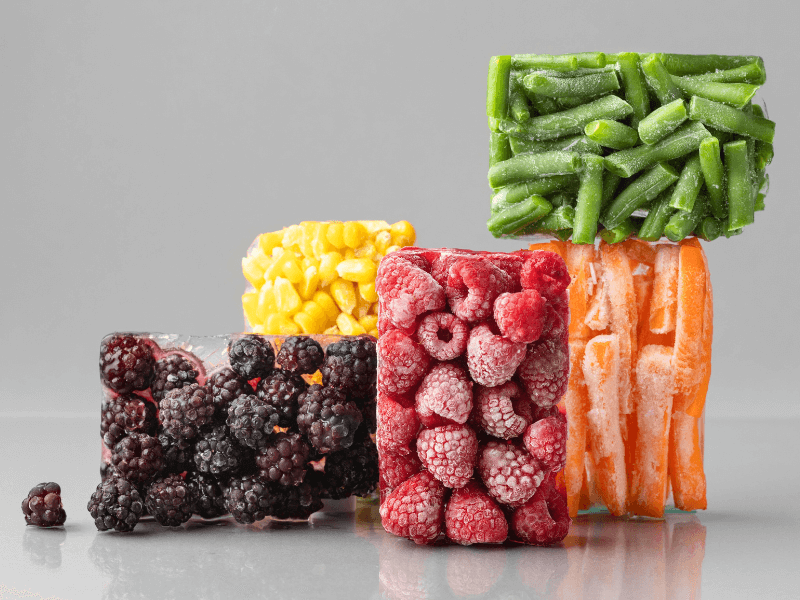In the realm of nutrition, frozen fruits and vegetables emerge as unsung heroes, often overshadowed by misconceptions about their nutritional value. Contrary to the stereotype of frozen foods being processed and lacking in nutrients, we delve into the myriad reasons why nutritionists opt for the frozen aisle, uncovering the health benefits that make frozen produce an invaluable addition to your diet.
Maturity Matters: The Journey from Harvest to Table
Preserving Peak Ripeness
The nutritional journey of fresh produce from harvest to the supermarket shelf can be lengthy and fraught with challenges. Frozen fruits and vegetables, however, are often frozen shortly after harvest, allowing them to reach full maturity. This ensures they are rich in essential vitamins, minerals, and antioxidants, as highlighted by the Academy of Nutrition and Dietetics.
Avoiding Nutrient Loss
The longer the gap between harvesting and consumption, the greater the potential for nutrient loss. Fresh produce that travels extensive distances may face nutrient degradation, impacting its overall nutritional value. Frozen produce, by being rapidly frozen, effectively locks in its nutritional content.
Nutrient-Rich Showdown: Fresh vs. Frozen
Research-Backed Equality
A 2015 study published in the Journal of Agricultural and Food Chemistry compared the nutrient content of fruits and vegetables stored in a refrigerator for varying durations to their frozen counterparts. Surprisingly, the study found that frozen produce was either equally or sometimes even more nutrient-rich than fresh produce. This included essential elements such as vitamin C, riboflavin, alpha-tocopherol (a form of vitamin E), calcium, magnesium, zinc, copper, iron, fiber, and total phenolics.
Antioxidant Boost
Another study conducted by the University of Chester in 2014 revealed that frozen fruits and veggies outperformed their fresh counterparts in antioxidant levels. This included polyphenols, anthocyanins, lutein, and beta-carotene. Contrary to the misconception that freezing destroys nutrients, the research indicated that freezing could enhance antioxidant levels.
Pure and Simple: The Additive-Free Advantage
Preserving Purity
One of the significant advantages of frozen produce lies in its additive-free nature. Freezing acts as a natural preservative, eliminating the need for unwanted additives like preservatives, salt, or sugar in frozen products such as spinach and strawberries. Opting for frozen fruits and vegetables often means embracing a “naked” produce experience, with ingredient lists featuring only the fruit or vegetable itself.
Checking Transparency
To ensure the purest options, it’s advisable to check the ingredient lists on frozen products. This guarantees transparency and ensures you’re selecting produce free from unnecessary additives.
Time-Saving Triumph: Healthy Shortcuts in the Kitchen
Prep-Free Convenience
One of the standout advantages of frozen produce is its time-saving convenience. According to the US Department of Agriculture (USDA), the average American spends approximately 37 minutes on food preparation and cleanup each day. Frozen fruits and vegetables, requiring no washing, peeling, or chopping, emerge as healthy shortcuts, enabling individuals to effortlessly incorporate them into home-cooked meals.
Aiding Healthy Choices
The ease of preparation that comes with frozen produce encourages healthier choices, steering individuals away from convenient but often less nutritious options such as takeout. With frozen options, whipping up nutritious dishes at home becomes a feasible and time-efficient endeavor.
Versatility Unleashed: Culinary Creativity with Frozen Produce
Beyond Smoothies
While frozen fruit in smoothies is a popular choice, the versatility of frozen produce extends far beyond. Thaw or warm frozen fruit for delightful oatmeal or use it as a topping on whole grain toast with almond butter.
Savory Delights with Veggies
Frozen vegetables shine in savory dishes. They make excellent chief ingredients for stir-fries, sautés with extra virgin olive oil, and delightful combinations with quinoa or brown rice pasta. The possibilities are endless, offering a palette of culinary creativity.
Your Nutrient-Rich Freezer: A Culinary Haven
In conclusion, the freezer section, often overlooked, stands as a treasure trove of nutritional power. Frozen fruits and vegetables, allowed to mature fully and frozen at their nutritional peak, deliver an abundance of essential nutrients. Research-backed evidence challenges the notion that fresh is always superior, highlighting the equal or sometimes superior nutritional content of frozen produce.
Embrace the convenience, purity, and versatility of frozen options as you navigate your culinary journey. Let your freezer be the gateway to nutritious meals, proving that health-conscious choices can be both accessible and delicious.
Read More: How to Add Your Links to TVPayz Channel A Comprehensive Guide


2 Comments
“Fantastic!”
“Impressive!”